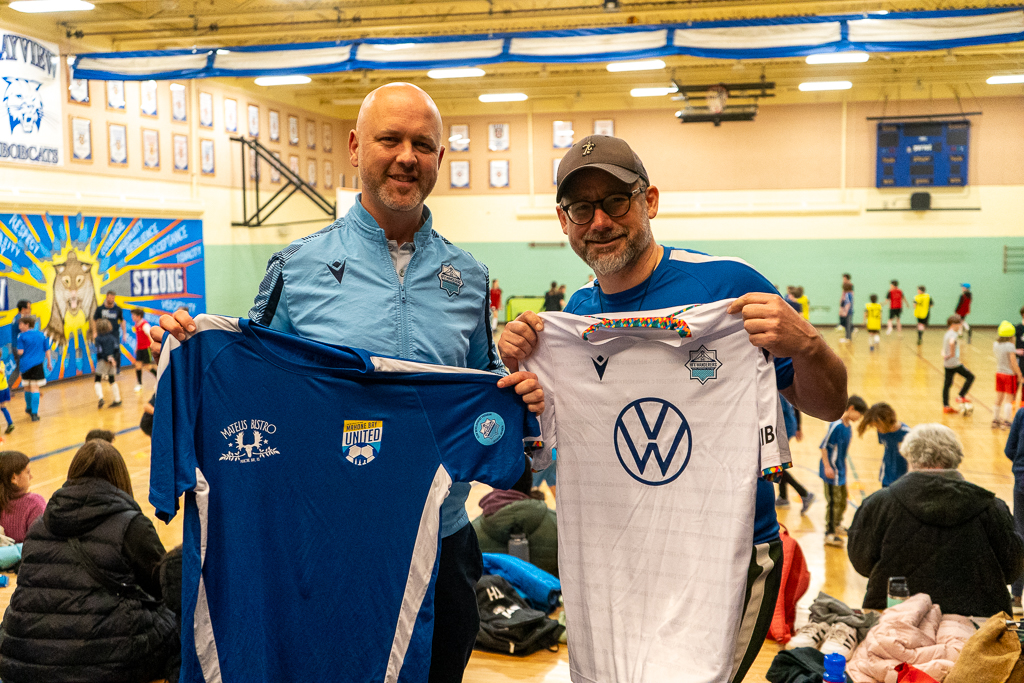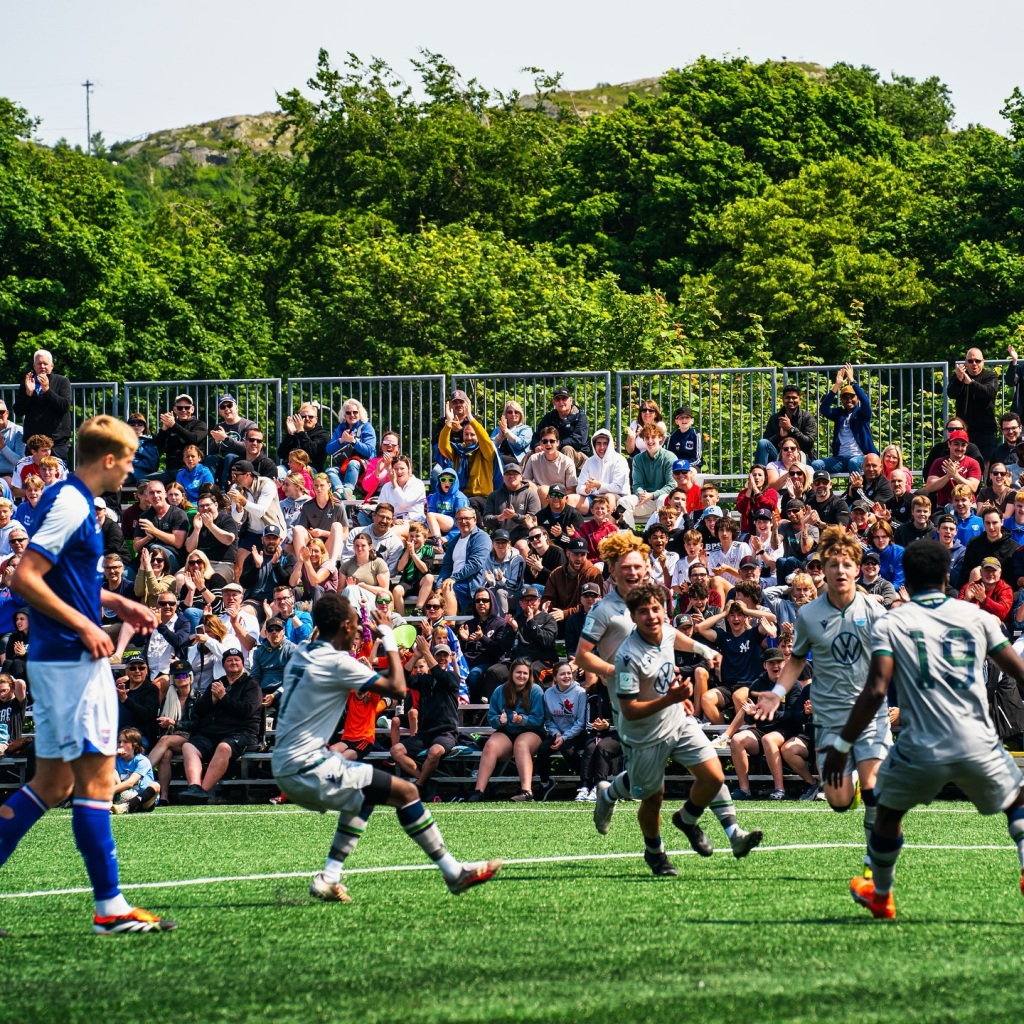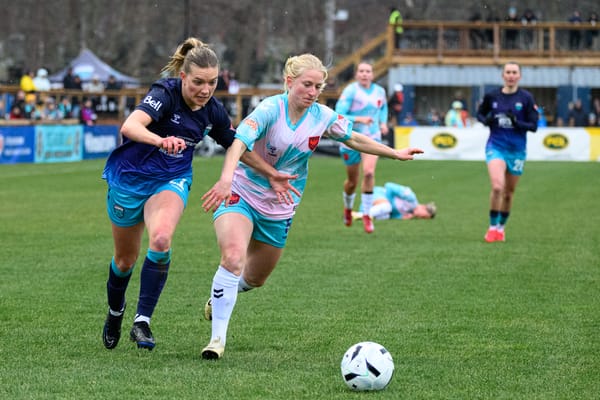Developing the next Maritime Messi: How the football pyramid, bit by bit, is being built in Nova Scotia

Jacob Shaffelburg knows he beat the odds. Or more accurately, given his meteoric rise for Canada, widespread popularity in MLS and moniker as Maritime Messi, blew them out of the water. He's risen to heights he believes, as he's told several outlets, to be near impossible for a footballer from Nova Scotia.
Citing Canada Soccer's fleeting interest in scouting Atlantic Canada, Shaffelburg quickly concluded as a youth player he needed to leave home to be seen. It's one of the reasons he proudly supports his fellow Bluenosers coming through his wake: he knows what they're going through.
"I'm looking out for anyone coming up through Nova Scotia because I had it tough," he told Joshua Kloke of The Athletic back in June. "I've been overlooked my whole life. Being from Nova Scotia, it sometimes feels like it's not even part of Canada."
That sentiment certainly applies to the rest of the Atlantic provinces. All four of Nova Scotia, Newfoundland and Labrador, Prince Edward Island and New Brunswick have long been on the periphery of the national association and the three MLS clubs' academies. Lacking proper facilities, resources and guidance meant that far too many Atlantic Canadians with potential didn't go as far as they could've had they been born in Toronto or Vancouver.
Part of the charm of Shaffelburg's story is that, from the outside looking in, he's risen unheralded like a tree from an asphalt sidewalk, a joyous footballer from a particularly un-footballish place. Most of the country widely regards Nova Scotia — and understandably so given the likes of Sidney Crosby, Nathan MacKinnon and Brad Marchand — as a hockey factory. Shaffelburg, who hails from Port Williams, is an anomaly to the national eye.
But like a strong easterly breeze, change is blowing across Nova Scotia's football landscape. The gaps, which were so daunting when Shaffelburg was growing up and chasing his dream of turning pro, are finally narrowing. Be it through the Halifax Wanderers or Halifax Tides, who will be part of the Northern Super League's (NSL) inaugural kickoff in 2025, there's never been a better time to be a football fan in Nova Scotia or, for that matter, a young player looking to get noticed.
This is not the same footballing world Shaffelburg last left in 2018.
With pro clubs in both the men's and women's game, there's a tangible path forming for players to follow in Nova Scotia. But the real windfall from these organizations extends far into the communities they touch, be it in Mahone Bay or Sydney, and the dreams they inspire. And with them comes the promise of League1 Atlantic, a permanent stadium at the historic Wanderers Grounds and maybe, one day, the next Maritime Messi who could stay and develop at home in the Maritimes.
How a club in Mahone Bay is overthrowing the North American model
An hour's drive from Halifax, nestled along the Lighthouse Route, is a community football club that have a way of doing things unlike any other in Nova Scotia.
Founded in 2015, Mahone Bay United was created to address fundamental gaps in access and training along the South Shore. One of their core tenets is that they believe football should be free for kids to play. Their other belief is that teaching technical ability in a welcoming environment equips kids to use football as a vehicle to increase the quality of their lives. For their efforts, the club was recognized by Canada Soccer in September for its accessibility.
Given the club's relative youth, the results speak for themselves.
"We've experienced exponential growth," says Tim Merry, Mahone Bay United's president and co-founder. "This past winter we had 300 kids, 45 coaches, three different locations and zero bucks to play."
Merry explains that Mahone Bay United's costs are covered through government grants, fundraising and community sponsorships, ensuring free football for kids through their Play program. Although there is the option to pay registration fees for some of their other programs, participants have the choice whether they want to contribute financially, a policy Merry believes is integral to ensuring fair access.
He says the North American pay-to-play club system is hamstringing Canada from maximizing its talent pool.
"When you have a pay-to-play system that doesn't actually allow access to a massive proportion of society, not only is it unethical, not only is it inequitable, it is a massive gap in sources of talent," he tells The Wanderers Notebook from his Mahone Bay office. "What we've done in Canada is we've excluded 20 to 30 per cent of the population from participating in the sport."
But Merry says, instead of being commended for their efforts, many see what Mahone Bay United has done as a threat to the North American football model. It's one of the reasons he's adamant change is needed.
"We need some way that names, connects and nourishes the people that are being fundamentally disruptive and innovative in (football) so we can accelerate into the future rather than preserving the status quo. The status quo isn’t serving people in the country, in our province and even in the region," says Merry.
Mahone Bay United is also very much a community club. Although they emphasize building a strong technical base for their players, starting kids as early as four years old on skills like toe taps, culture rates just as highly.
Juliette Haughn, who coaches in addition to her role as club vice-president, says the familial atmosphere has ensured the club's foundation has been laid for long-term growth in their community.
"The family and the community piece is at the core of all our decisions. It’s about creating (football) families. We provide access, not just for the kids, but for the adults as well. To play, to coach, to run events. There’s a familiarity in the club," she says.

There's familiarity with the local pro clubs, too. Mahone Bay United was the first club to sign up for the Halifax Wanderers development program, which sees professional resources, staff and development tools shared with local organizations. And with the Halifax Tides set to make their debut in the NSL, Haughn says she can't wait for her club's female players to have role models close to home.
"I think it's going to be so inspiring," she says. "We have a few very talented young ladies with us. We're really working with how to support them when you talk about high potential players."
But it's all part of a club culture that is based on technical skills and hard work. From day one, says Merry, Mahone Bay United has endeavoured to build a curriculum based on ball skills, leaning heavily into futsal as a background for training.
Ultimately, be it futsal or their partnership with the Wanderers, the leadership at Mahone Bay United says they're working for the betterment of the local community, which will inevitably produce better football players.
“Professional players are a byproduct of a beautiful club culture and a well-designed program that equips kids for life. And every now and then, a Jacob Shaffelburg is going to pop out of those clubs and perform," says Merry in summary. "But if your aim is a Shaffelburg, I don’t think you’re serving the sport.”
How the Wanderers and Tides are creating a platform for Atlantic Canadian players
When he speaks about player development, Wanderers sporting director Matt Fegan comes alive. It's a passion of his and something he's tried to cultivate, year after year.
Most recently, his labours are best reflected in the International Summer Series, a collection of club friendlies pitting the Wanderers U-21 squad against international competition. It's since grown, with this year's iteration featuring English Premier League side Ipswich Town and EFL Championship's Middlesbrough FC with matches played across all four Atlantic provinces.
"The International Summit Series — and you can hear it in my voice, hopefully — is a really exciting part of the project I have the responsibility to advance," says Fegan, seated in the press box at the Wanderers Grounds. "Yes, the short term is Patrice (Gheisar) and the coaching staff's needs on the first-team to win the game on a Saturday but my job is also to be looking at things in years. I think, in the Canadian Premier League, we have shown the most commitment to, structurally, year on year, growing the game."
The Wanderers fielded a roster of U-21 players from across Atlantic Canada for the series. Some, like Halifax's Yorgos Gavas, had development contracts with the club. But many, be they 15-year old Ben Marsh or former Valour draft pick Owen Sheppard, were there because of the platform and level of competition the series offered.

Given their results against quality European competition, which included highlights like Marsh's match winning goal against Ipswich at King George V Park in St. John's, N.L., Fegan says he believes in the talent pool in Atlantic Canada.
“We had 15-year olds playing in those games and they held their own. There’s talent in this region. Put the right structure around them, put them into those environments," he said.
"How many kids in the last 10, 15, 20 years by the age of 15 scored a goal like the one Ben Marsh did in front of 4,500 people? You can’t tell me that wasn’t an amazing experience for them. I think the International Series is a very obvious and visible reflection of our dedication to putting money into creating more development pathways.”
However, the success of the International Summer Series doesn't only rely on the hard work of Fegan and the Wanderers. In its early years, with only the promise of what the program could be, players — be they locals or university athletes attending school in Nova Scotia — believed in the Wanderers' vision and signed on to stay for the summer. Bit by bit, the U-21 program has grown to encompass dozens of competitive matches throughout the course of the summer with domestic and international competition. Sprinkle in the possibility of training with the Wanderers first-team and you start to understand what Fegan and the Wanderers are building. They've managed, at least in part, anyways, to fill the gap which could eventually be bridged by League1 Atlantic for players that are too good to be amateurs but not ready for Halifax's first-team.
“I’m excited by the fact that a Ben Hashimoto played in front of P.E.I. fans, that an Owen Sheppard played in front of fans in St. John’s, that Dan Clarke played at Cape Breton University. It takes those individuals to show others that thought they had to leave (Atlantic Canada) to get that chance that you can find that chance here," says Fegan.
The growing list of young players who have trained or spent time with the Wanderers is impressive. Kimani Stewart-Baynes was drafted and signed by MLS side Colorado Rapids. Ethan Schilte-Brown is in the Scottish Premiership. Gavas recently left to play for Drexel University in the NCAA.
When speaking about the players who have passed through the club, Fegan says there's pride in having them been part of the Wanderers program, even if just for a short time.
“Yeah, selfishly we want them all to be Wanderers players but there’s success in Yorgos Gavas getting a fantastic scholarship to pursue an academic education with his football," he says.
"It’s not a failure that he didn’t make the first-team yet. Credit to the Vancouver Whitecaps, too. These environments have helped him to a higher level and made football a tool for him to pursue his education.”
The Halifax Tides are at the beginning of their journey. But like the Wanderers, they recognize their role in helping to raise the level of football across the region. Finally having a professional domestic women's league — a groundbreaking moment in Canada for women's football — is not lost on them.
Amit Batra joined the Tides as their sporting director after coaching nearly 15 years with Acadia University. Over the course of his tenure there, the women's soccer program made six AUS Championship game appearances, taking home the title in 2021. Given the flurry of support around women's sports, and his knowledge of the local sporting landscape, he says he feels the importance of delivering in the moment.
"It's fun, it's exciting but it's also immense," he says. "There’s so many people in the (football) community, but even outside, that are already behind us. You can draw energy from that.”
One of the things he's most excited about is using the platform he's been given to help local talent develop. Previously, when at Acadia, he often saw players who had the talent to go to the next level but weren't ready or didn't have the passport to travel to pursue a professional career. Thanks to the Tides, the next generation of female players will have the opportunity to train and play locally.
https://twitter.com/hfxtidesfc/status/1806737658011427141
"I think it’s important because it’s almost been sad to see players not have their opportunity. I almost felt like I didn’t have a choice but to be involved with this," says Batra.
When asked about having Nova Scotia players in their inaugural squad, Batra confirms it's a priority for the club.
“For us, it’s important to have somebody local develop here in front of their own fans and to provide the opportunity so they don’t have to move away. That’s the whole reason for this league," he explains. "I think it’s going to be great for us, the fans and for that athlete or two.”
Batra adds that the Tides haven't made a decision on how they'll create programming to develop players, noting there's two or three options on the table, but they've already been active in the community and meeting with various local clubs. Their goal, he says, isn't to about pulling players away from their community clubs but to help raise the level through partnerships.
The Tides are still several months away from kickoff. No players have been announced yet. But Batra and the rest of the staff are aware that the work they're doing now is crucial to helping to further the quality of football in the region.
And in terms of developing the next Maritime Messi, Batra highlights the fact that Nova Scotia already punches above its weight in the female game.
"There’s been a female player from Nova Scotia for almost every one of the last several U-20 World Cups. There’s almost always a player from Nova Scotia in the lineup. Because of the level of talent coming up, that maybe not everyone is aware of, I think there’s great potential for the fans and community to really get behind some of these homegrown players," he says.
How clubs like Suburban FC are raising the level
Make no mistake: football registrations are on the rise in Nova Scotia.
As per Soccer Nova Scotia, roughly 25,000 players were registered this summer, giving the province the fifth biggest player base in Canada. Their figures have risen by 4,000 players since 2019.
And more players have meant bigger clubs. One of those clubs is Suburban FC, which over the last number of years has grown to become one of the most influential in the Atlantic region.
Speaking to Suburban's sporting director, Oliver Hewish, the club's ambitions have grown from being a leading club in their area to one of the best in Canada. Some have questioned their intentions, accusing them of wanting to move up the football pyramid.
Hewish, to put it mildly, is emphatic in his response.
"Effing right we do, yes, we want to be more than a community (football) club. We have ambitions. There's no reason we can't end up in a League1 scheme," he says in an interview with The Wanderers Notebook.
But the important thing, notes Hewish, is the manner the club has gone about raising the level. They've hired extremely credibly and capable coaches, including former Wanderers in Akeem Garcia and Cory Bent. They've gone out and secured their national youth license, the first and only club in Atlantic Canada to hold the distinction. And they've worked to create programming that caters to every level of footballer. In essence, they've raised the bar and developing quality players is a result of their commitments.
"We just have to make sure that everything we do and we believe in will help these kids," Hewish explains. "No matter what level they want to get to, if that's the next Shaffelburg, unbelievable. If it's the next business owner in Halifax, fantastic. If it's a teacher, if it's a principal, if it's a community leader. Great, check, check, check. It's a byproduct of the environment we're trying to create."
Suburban was a key organizer in last year's Maritime Super Series, an event meant as an exhibition for a potential pro-am expansion league to Atlantic Canada. Conversations around League1 Atlantic, after a brief hiatus, have since picked back up, potentially adding another important step between the amateur and professional outfits in the region. Understandably, the event was a labour of love and is the type of herculean task football-lovers across Atlantic Canada are throwing themselves into to further the sport.
When asked about the biggest change he's seen over the last number of years, Hewish is quick to point out the people in positions to make a difference.
"There's a reason I'm here. There's a reason (club executive director) Jesse Burgins is here. There's a reason (Wanderers assistant coach) Jed Davies is here. There's a reason the Tides have become a team. There's something in this region — whether it's players, whether it's coaches, or whether it's the culture — worth being obsessed about," he says.
"We've already seen it with the Tides. They haven't even kicked the ball yet but they're all over the community. They're heavily involved with the youth clubs, with the Canada Games programs, same on the flip side of the Wanderers. For God's sake, they beat a Premier League academy twice and a Championship academy. That's real change in my opinion. The biggest change comes down to the people who want to make change."
From the outside looking in, Shaffelburg's rise can easily be attributed as an outlier, an anomaly originating from a small blip on the edge of the Atlantic Ocean. But people in Nova Scotia, be it Merry or Haughn or Hewish, are building something that is grounded in community for the next generation of football players. And come April, 2025, there'll be professional men's and women's football being played in the province. League1 Atlantic could arrive as soon as 2026.
And maybe, just maybe, between these parties working away, doing their own small piece, they might develop the next Shaffelburg.
Cover Photo Credit: Q97.9 News



